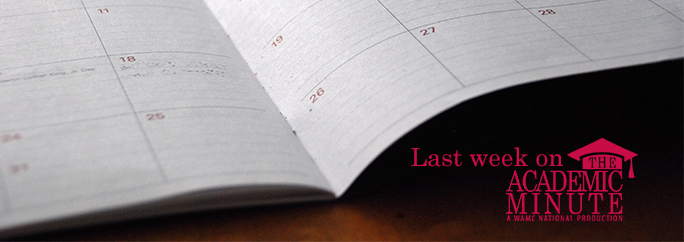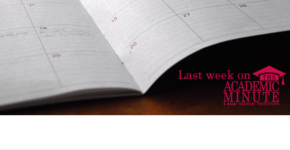
The Academic Minute from 11.22 – 11.26
Monday, November 22nd
Kerry Whigham – Binghamton University
Reparations
Kerry Whigham is Assistant Professor of Genocide and Mass Atrocity Prevention at Binghamton University’s Institute for Genocide and Mass Atrocity Prevention (I-GMAP). He received a Ph.D. in Performance Studies from New York University. He has published articles in Genocide Studies and Prevention, The Journal of Latin American Cultural Studies, Public Administration Review, Tourist Studies, Material Culture, and Museum and Society, and has written chapters for several edited volumes. His first book, Resonant Violence: Affect, Memory, and Activism in Post-Genocide Socities, will be published in 2021 by Rutgers University Press. He is the Communications Officer and a member of the executive board for the International Association of Genocide Scholars (IAGS). He is also the curator of Artivism, an art exhibition on the connection between art, activism, and atrocity prevention that began in Venice during the 2019 Art Biennale and is now traveling to museums around the world.
Tuesday, November 23rd
Mark Stelzner – Connecticut College
The Intensity of Slavery and the Birth of Modern Capitalism
For the last few years, Mark Stelzner has been working on better understanding income inequality in the United States. He has conducted research on the evolution of labor laws during the Gilded Age and over the last forty years, the relationship between labor laws and inequality, the income shares of top earners in the late 1860s, the connection between support for workers and technological change, the evolution of antitrust administration since the 1960s, the link between inequality and politics, the connection between monopsony power and wage discrimination between like workers of different race, ethnicities, and gender groups, and the degree to which Americans have overpaid for private medical care. His work has been featured in the Economist, the Nation, the Washington Center for Equitable Growth, the Center for American Progress, History, and other venues.
Wednesday, November 24th
Blake Alexander Simmons – Boston University
Social and Environmental Risks of China’s Overseas Development
Dr. Blake Alexander Simmons is a Postdoctoral Research Fellow at Boston University’s Global Development Policy Center. He is an interdisciplinary conservation scientist with an interest in how economic, political, and psychological factors influence environmental outcomes in social-ecological systems. His current research is investigating the impacts of China’s Belt and Road Initiative on biodiversity and Indigenous peoples.
Thursday, November 25th
Chris Impey – University of Arizona
The Dark Ages of the Universe
Chris Impey is a University Distinguished Professor of Astronomy at the University of Arizona. He has 210 refereed publications on observational cosmology, galaxies, and quasars, and his research has been supported by $20 million in NASA and NSF grants. He has won eleven teaching awards and has taught three online classes with over 350,000 enrolled and 5 million minutes of video lectures watched. Chris Impey is a past Vice President of the American Astronomical Society, and he has won its career Education Prize. He’s also been NSF Distinguished Teaching Scholar, Carnegie Council’s Arizona Professor of the Year, and a Howard Hughes Medical Institute Professor. He has written 80 popular articles on cosmology, astrobiology and education, two textbooks, a novel called Shadow World, and nine popular science books: The Living Cosmos, How It Ends, Talking About Life, How It Began, Dreams of Other Worlds, Humble Before the Void, Beyond: The Future of Space Travel, Einstein’s Monsters: The Life and Times of Black Holes, and an upcoming book on exoplanets, Worlds Without End.
Friday, November 26th
Ben McCall – University of Dayton
Modernity is Incompatible with Planetary Limits
Ben McCall, a professor of sustainability and executive director at the Hanley Sustainability Institute at the University of Dayton, is a founding member of the Planetary Limits Academic Network to promote the understanding of planetary limits, envision scenarios for humanity to thrive within planetary limits, better educate college students about these challenges, and advise government officials and communities in developing effective responses. Other founding members include Tom Murphy, professor of physics at the University of California at San Diego; David Murphy, associate professor and department chair of environmental studies at St. Lawrence University; Melody LeHew, a professor of interior design and fashion studies at Kansas State University; and Tom Love, professor emeritus of anthropology at Linfield University.
